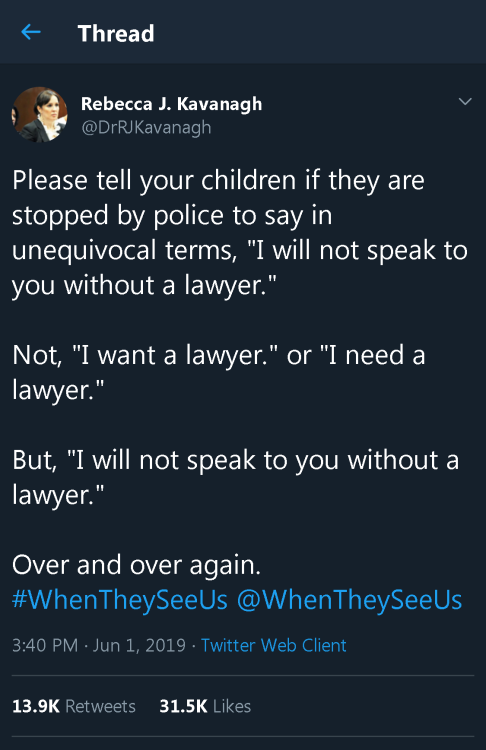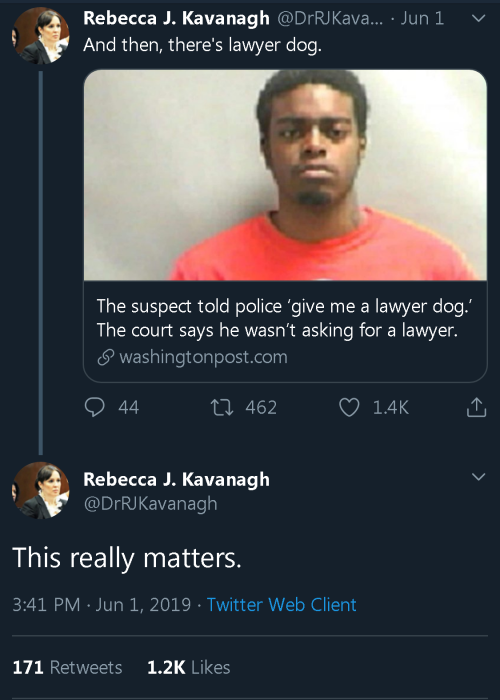lemonsharks:penrosesun:guidetodreaming:One of the most important things I learned in my Language and
lemonsharks:penrosesun:guidetodreaming:One of the most important things I learned in my Language and the Law class is that law enforcement will intentionally misinterpret every type of statement asking for a lawyer as not asking for a lawyer. Even directly saying it like this “I will not speak to you without a lawyer” can be taken as a simple statement of fact rather than a request for a lawyer. You literally have to state “I am now invoking my right to a lawyer” and every time they try to proceed with an interrogation you have to answer every question with “I am invoking my right to have a lawyer present”. You can’t just tell them you won’t talk without a lawyer or that you want a lawyer. You have to state that you are invoking your rights. Otherwise they could just say “well they just said they wouldn’t speak without a lawyer present. That’s not invoking their rights to a lawyer. It’s just stating a fact.” even just stating your right to a lawyer doesn’t count!PLEASE share this addition. I am a lawyer who works in criminal defense, and this is one of the most avoidable things that people consistently get wrong about the Miranda rights.Here are some more “ambiguous” phrases which courts have found DO NOT invoke your right to a lawyer:“Maybe I should speak to my lawyer first.”“I might like a lawyer.”“I think I should have a lawyer present for this.”“Could I speak to my lawyer first?”“How long until my lawyer gets here?”And perhaps most egregiously – “Get me a lawyer, dawg – ‘cause this is not what’s up.”Here are the magic phrases which you need to know if you want to invoke your Miranda rights:1) “Am I free to leave?”It’s worth asking this even if the answer is obvious. Even if the officer does not let you leave, by forcing them to admit that you are not free to leave, you are creating a record which your attorney can use to prove that you were in custody. Miranda rights only apply if the interrogation is custodial, meaning that police officers will frequently claim that their suspects were “not in custody” to get around their Miranda rights.2) “I am invoking my right to remain silent.”Simply staying silent will not invoke your right to remain silent. As absurd as this is, you must explicitly say that you are invoking your right to remain silent in order to invoke that right.3) “I am invoking my right to an attorney.”As stated above, you must be not only clear and unambiguous, but clear and legally unambiguous. Don’t get cute. Don’t get sassy. And on the flip side, don’t get intimidated and use verbal ticks to minimize your request. Say the line with those words exactly – say it clearly, and say it once, and then say nothing else.Because even after you’ve done all this, the police can still try to get you to talk. They’re not supposed to interrogate you, but they’re allowed to make casual conversation, and if that conversation just happens to circle back around to the thing they wanted to question you about, well, that’s really your fault for talking after you said you wouldn’t, isn’t it? Can’t possibly fault the poor officers when you initiated – if you really wanted to have your rights respected, you wouldn’t have talked to them in the first place.The police know this, and they will mercilessly exploit this loophole. So, once you’ve successfully invoked your Miranda rights, any and all conversation you have with police officers will put those rights back into jeopardy. Putting it all together:Ask: “Am I free to leave?”If they say no, say: “I am invoking my right to remain silent and I am invoking my right to an attorney.”And then shut up and do not say a single thing to them for any reason whatsoever until you have actually spoken to an attorney. Yes, even if it takes hours. Yes, even if they start talking to you about something else.Finally, a very important disclaimer:I may be a lawyer, but I’m not your lawyer, and I cannot guarantee that what I’ve just laid out here will always work for every situation. We didn’t get to this bizarre and absurd place overnight – we built this ridiculous system piecemeal, by deciding on a case-by-case basis that certain phrases were “too ambiguous” or certain types of questioning weren’t actually questioning at all. The law is still in flux, and is still fundamentally out to get you, and willing to bend plain meaning beyond all recognition to do it. Even if you invoke your rights perfectly, exactly as I have specified above, there’s a chance that your invocation of rights will be disqualified on some new technicality that no one’s even thought of yet – and that’s precisely the problem.Watch this video: “Don’t Talk To The Police” -- source link


